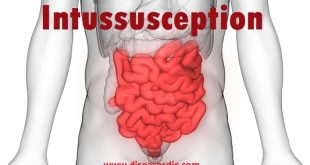Definition
Blind loop syndrome (BLS), also known as stagnant loop syndrome, is a state that occurs when the normal bacterial flora of the small intestine proliferates to numbers that cause significant derangement to the normal physiological processes of digestion and absorption. In some cases of blind loop syndrome, overgrowth of pathogenic non-commensal bacteria has also been noted. It has long been understood that from birth, and throughout life, large amounts of bacteria reside symbiotically within animal gastrointestinal tracts such as the human gastrointestinal tract.
The understanding of this gut flora has even led to novel treatments for bowel irregularity that utilize so-called “probiotics” or good bacteria that aid in normal digestion. The problem of BLS arises when the bacterial colonies residing in the upper gastrointestinal tract begin to grow out of control or are altered in their makeup thereby creating a burden on the normal physiological processes occurring in the small intestine. This results in problems, among others, of vitamin B12 deficiency, fat malabsorption and steatorrhea, fat-soluble vitamin deficiencies and intestinal wall injury.
Pathophysiology
The overgrowth of bacteria in the small intestine is prevented by various mechanical and chemical factors which include the constant peristaltic movement of contents along the length of the gastrointestinal tract and the antibacterial properties of gastric secretions, pancreatic secretions and bile.
It follows that a disruption of any of these factors could lead to bacterial overgrowth and indeed BLS has been found to occur in persons with anatomical anomalies that result in stagnation. BLS has also been associated with achlorhydria, dysmotility, fistulae, and strictures. Chronic or high dose opioid therapy may contribute to BLS by reducing gastric motility.
Due to the disruption of digestive processes by the overgrowth of intestinal bacteria; malabsorption of bile salts, fat and fat-soluble vitamins, protein and carbohydrates results in damage to the mucosal lining of the intestine by bacteria or via the production of toxic metabolites.
Causes of Blind Loop Syndrome
Blind loop syndrome is caused by abnormal movement within the digestive tract, leading to bacterial overgrowth. The small intestine is where food mixes with digestive juices and nutrients, so when food is bypassed, it becomes an ideal area for bacteria to develop, causing blockage in the absorption of nutrients.
Blind loop syndrome can be caused by:
- Structural problems found in or around the small intestine
- Complications from major surgeries such as gastric bypass for obesity and gastrectomy to treat ulcers and stomach cancer
- Medical conditions that slow movement of food and waste products through the small intestine. These include: Crohn’s disease, scleroderma, radiation enteritis, obesity and diabetes.
Blind Loop Syndrome risk factors
Factors that increase your risk of blind loop syndrome include:
- Gastric surgery for obesity or ulcers
- A structural defect in the small intestine
- An injury to the small intestine
- An abnormal passageway (fistula) between two segments of bowel
- Crohn’s disease, intestinal lymphoma or scleroderma involving the small intestine
- History of radiation therapy to the abdomen
- Diabetes
- Diverticulosis of the small intestine
Symptoms of Blind Loop Syndrome
One of the main symptoms of blind loop syndrome is unexplained weight loss. This occurs when your small intestine can’t digest food and absorb nutrients. When your body isn’t getting the nutrients and fat it needs, weight loss occurs.
If severe bacterial overgrowth occurs it can rarely inflame your intestinal lining. And in a few cases the intestinal bacteria can get into the blood. This bacterial infection can cause:
- Fever
- Arthritis-like joint pain
- Skin rash or red bumps on the skin
- Inflamed tendons
- Muscle pain or aches
Poor absorption of nutrients and poor nutrition can cause a number of symptoms, such as:
- Frequent diarrhea
- Nausea or vomiting
- Belly (abdominal) swelling from fluid buildup
- Swelling of the legs
- Belly pain and cramping
- Stools that seem loose and fatty
- Fatigue or weakness
- Gas and bloating
Blind Loop Syndrome Complications
A blind loop can cause escalating problems, including:
Poor absorption of fats: Bacteria in your small intestine break down the bile salts needed to digest fats. As a result, your body can’t fully absorb the fat-soluble vitamins A, D, E and K. Incomplete absorption of fats leads to diarrhea, weight loss and vitamin deficiency disorders.
Damage to the intestinal lining: Toxins that are released when bacteria break down stagnant food harm the mucous lining (mucosa) of the small intestine. As a result, most nutrients, including carbohydrates and proteins, are poorly absorbed, leading to serious malnourishment.
Vitamin B-12 deficiency: Bacteria in the small intestine absorb vitamin B-12, which is essential for the normal functioning of your nervous system and the production of blood cells and DNA. A severe B-12 deficiency can lead to weakness, fatigue, tingling and numbness in your hands and feet, and, in advanced cases, to mental confusion. Damage to your central nervous system resulting from a B-12 deficiency may be irreversible.
Brittle bones (osteoporosis): Over time, damage to your intestine from abnormal bacterial growth causes poor calcium absorption, and eventually may lead to bone diseases, such as osteoporosis.
Kidney stones: Poor calcium absorption may also eventually result in kidney stones.
Diagnosis of Blind Loop Syndrome
Your healthcare provider will ask about your symptoms, your medical, surgical, and family history. He or she will request tests to test for nutrient absorption, anemia, or to rule out other conditions. Tests may include:
- Blood tests to check for infections and nutrition status
- Breath tests to look for bacterial overgrowth
- Tests to check organ function
- Test to check for inflammation in the body
- Exam of stool for fecal fat, stool culture, parasites, white blood cells
- Imaging tests to evaluate the intestinal anatomy
- Possible colonoscopy or upper endoscopy to evaluate the intestinal lining
Treatment
Surgical excision of the blind loop or revision of the bowel bypass cures bowel bypass syndrome.
Short courses of systemic corticosteroids are effective for symptoms but not curative.
Antibiotics may also be beneficial. Regimes reported to be effective include:
- Minocycline
- Erythromycin
- Clindamycin
- Trimethoprim + sulphamethoxazole
- Metronidazole
Nutritional support
Correcting nutritional deficiencies is a crucial part of treating blind loop syndrome, particularly in people with severe weight loss. Malnutrition can be treated, but the damage it causes can’t always be reversed.
These treatments may improve vitamin deficiencies, reduce intestinal distress and help with weight gain:
- Nutritional supplements: People with blind loop syndrome may need intramuscular injections of vitamin B-12, as well as oral vitamins, calcium and iron supplements.
- Lactose-free diet: Damage to the small intestine may cause you to lose the ability to digest milk sugar (lactose). In that case, it’s important to avoid most lactose-containing products, or use lactase preparations that help digest milk sugar.
- Some people may tolerate yogurt because the bacteria used in the culturing process naturally break down lactose.
- Medium-chain triglycerides: Most dietary fats consist of a long chain of fat molecules (triglycerides). Some people with blind loop syndrome have an easier time digesting medium-chain triglycerides, found in coconut oil.
- Medium-chain triglycerides are sometimes prescribed as a dietary supplement for people with severe blind loop syndrome resulting in short bowel syndrome.
 Diseases Treatments Dictionary This is complete solution to read all diseases treatments Which covers Prevention, Causes, Symptoms, Medical Terms, Drugs, Prescription, Natural Remedies with cures and Treatments. Most of the common diseases were listed in names, split with categories.
Diseases Treatments Dictionary This is complete solution to read all diseases treatments Which covers Prevention, Causes, Symptoms, Medical Terms, Drugs, Prescription, Natural Remedies with cures and Treatments. Most of the common diseases were listed in names, split with categories.







